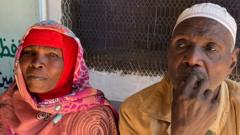UN Relief Chief Reveals Devastating Humanitarian Crisis in Darfur
In a rare journalistic visit to el-Geneina, Sudan, the UN’s new relief chief Tom Fletcher witnessed the catastrophic aftermath of a brutal conflict that has transformed the region into a ghost town. The area, once vibrant, now stands as a haunting testament to widespread destruction, with charred buildings, bullet-riddled structures, and abandoned streets.
Fletcher described Darfur as experiencing “the worst of the worst,” highlighting a crisis characterized by extensive sexual violence and the imminent threat of famine. The conflict primarily involves two rival forces: the Sudanese Armed Forces (SAF) led by Gen Abdel Fattah al-Burhan and the Rapid Support Forces (RSF) led by Gen Mohamed Hamdan Dagalo.
The RSF and allied Arab militias have been accused of ethnic cleansing, particularly targeting the non-Arab Masalit community. Human rights organizations have characterized the violence as potential genocide, with an estimated 15,000 people killed in massacres over several months.
Refugees in a Chadian border camp shared harrowing stories of survival. A 14-year-old girl recounted how her family had to hide during the day and travel only at night to avoid being killed. Elderly women spoke of indiscriminate killings of women, children, and babies, and the complete disruption of their agricultural livelihoods.
The conflict’s roots trace back to 2003 when the Arab Janjaweed militia first began terrorizing non-Arab communities, ultimately giving rise to the RSF. Today, the situation has deteriorated dramatically, with nearly 99.9% of the population in need of humanitarian assistance.
International aid organizations are struggling to provide support, operating without reliable communication infrastructure and facing significant bureaucratic challenges. Tariq Riebl from the Norwegian Refugee Council expressed concern that the crisis is being overlooked amid other global conflicts like Ukraine and Gaza.
The Famine Review Committee has already declared a famine in one displacement camp, with multiple other areas on the brink of severe food insecurity. Regional powers are complicating the situation, with different countries supporting various factions: the UAE allegedly backing the RSF, while countries like Egypt, Iran, and Russia support the SAF.
UN Relief Chief Fletcher is attempting to negotiate increased humanitarian access and push for an end to the conflict. He acknowledges the complexity of ending “impunity” in a situation with multiple international actors involved.
The visit highlights the urgent need for international attention and intervention in what is being described as potentially the world’s most challenging humanitarian crisis. The devastation in Darfur represents not just a local conflict, but a profound human tragedy that demands global compassion and immediate action.




